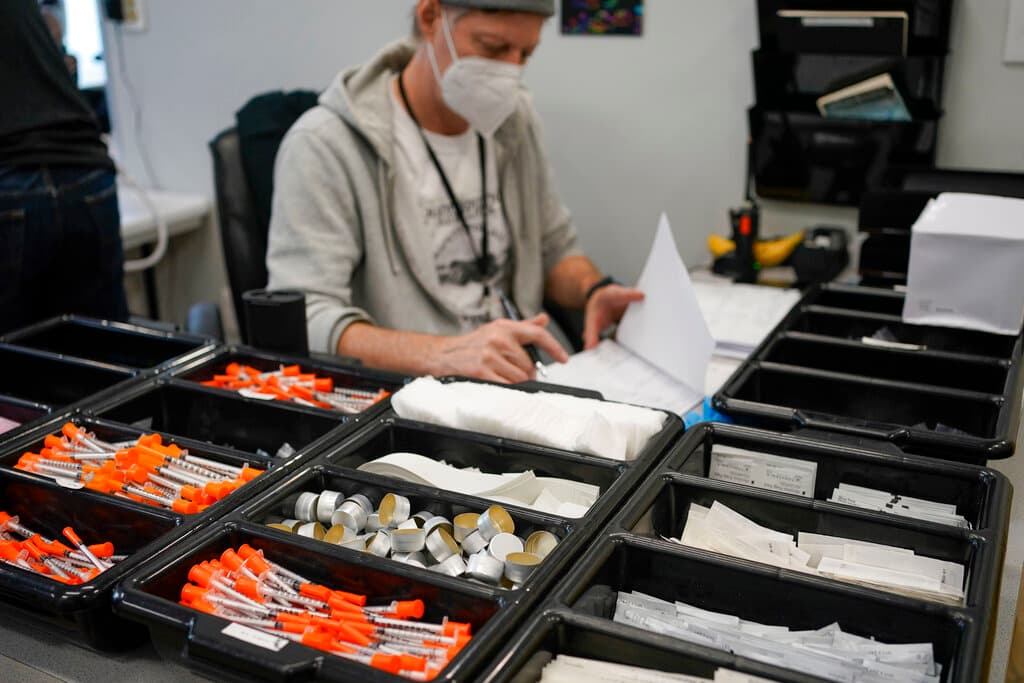Massachusetts Lawmakers, Grappling With Record-High Overdose Deaths, Weigh ‘Hygienic’ Drug Injection Sites
The centers would provide a safe space for individuals to consume pre-obtained illegal drugs, as well as ‘sterile injection supplies.’

Safe drug consumption sites could soon be legal in Massachusetts, which has been ravaged by the opioid epidemic, if lawmakers approve legislation that would establish a program allowing cities and towns to build them.
The bill before the legislature aims to create a 10-year pilot program that would establish sites providing “a hygienic space” for individuals to use pre-obtained illegal drugs, as well as “sterile injection supplies” and “collect used hypodermic needles and syringes” for drug users.
Massachusetts, like states across the country, is reeling from record-high overdose deaths — with 2,357 opioid-related overdose deaths last year. The proposed legislation notes the program would be “for the purpose of reducing the risks of disease transmission and preventing overdose deaths,” a point echoed by advocates of the sites, who say establishing safe resources for drug users is a critical part of fighting the overdose epidemic.
Yet, critics warn that giving drug users supplies enables addiction, and say the sites endanger the neighborhoods they’re built in since they can foster open drug use and crime.
If the legislation passes in Massachusetts, it could signal changing public opinion on the sites, and other states are likely to watch how the program plays out. A study published by JAMA Open Network in November “found no significant increases in crimes recorded by the police or calls for emergency service in NYC neighborhoods” where two operating sites exist, which garnered press attention and support to remove barriers to the sites elsewhere.
Recent Beacon Research polling of “randomly selected” Massachusetts voters — sponsored by the American Civil Liberties Union of Massachusetts — found 70 percent of voters support the safe consumption site legislation, with 85 percent of Democrats and 53 percent of Republicans in support of it.
The contentious tactic of building safe injection sites has been legally fraught in cities like Philadelphia, as the Sun has reported, where the City Council recently banned building the sites in most of the city and where a nonprofit called Safehouse has been entrenched in a years-long legal battle to build a safe consumption site.
The federal government says the sites are in violation of federal law, since the Controlled Substances Act prohibits managing sites for illegal substance consumption. In court this week, Safehouse argued federal prohibitions on building the sites are a violation of advocates’ religious freedom, saying they have a duty to preserve human lives at all cost.
A Safehouse representative was not immediately reachable for comment Friday, but its co-founder, Ronda Goldfein, previously told the Sun the overdose crisis called for an “all hands on deck” approach and said Safehouse will continue fighting for a way to open a consumption site.
Despite being called safe injection sites, “there is hardly anything ‘safe’ about them,” the former Deputy Attorney General, Jeffrey Rosen, has argued, noting back in 2020 the growing efforts to bring the sites to the United States.
“These facilities typically have a ‘bring your own drugs’ policy and no mandatory testing to determine if the drugs were purchased from criminal dealers,” he warned. “They also allow users to bring any drug into their facility, including methamphetamine, for which there is no overdose reversal medication.”
“Addictive drug injection site supporters argue that they provide ‘treatment’ to drug users. But enabling those suffering from addiction to go to the brink of death is a dubious treatment,” he added, noting that injection sites also “endanger the surrounding community” by providing a hub of drug users, therefore luring drug dealers and criminal activity.
The sites in Massachusetts, if legalized, would be licensed and regulated by the state’s public health department and staffed with healthcare professionals who would provide “education on safe consumption,” monitor individuals for overdoses and “administer first aid” and provide resources for addiction treatment.
Some in Massachusetts say the topic is an issue of state sovereignty. One doctor, Peter Friedmann, who is also chief research officer at Baystate Health, pointed out that Massachusetts legalized marijuana despite federal laws against recreational use, MassLive reported.
“That’s not even something that’s life-saving,” Dr. Friedmann said. “We’re in the midst of an unremitting epidemic of opioid overdose deaths. This is a more compelling reason … to assert states’ rights.”
The Sun reached out to several Massachusetts senators who are supporting the bill, none of whom were immediately able to comment, including a state senator, Julian Cyr, who was the bill’s presenter.

